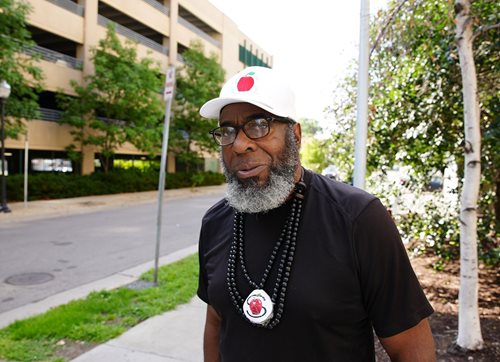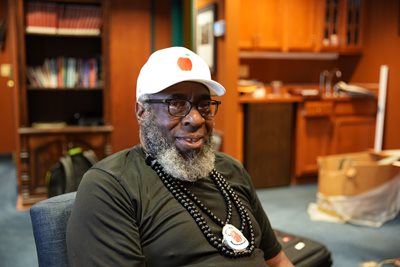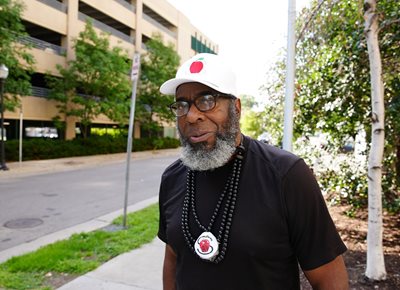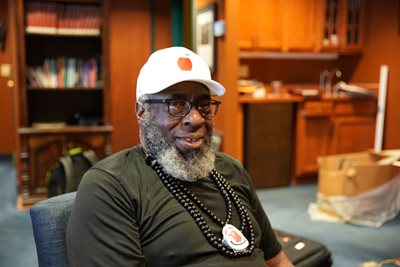Vaya al final de la página para leer esta historia en Español.
James Page, Jr., calls them "spiritual apples," the daily meditations he says aloud and shares with community members facing challenges: addiction, homelessness, hopelessness.
"An apple a day," Page says. "You know what they say." But in this case, it's not the doctor he's trying to keep away; it's the urges of addiction — urges he's faced many times over the years with alcohol and with drugs. With his apples, he says, he encourages people to have "the self-motivation to overcome."
 Page connects with people wherever he goes — and inspires them, too. He runs sobriety meetings at a church in St. Paul, Minnesota. He spent much of the pandemic serving as a link between those experiencing homelessness — as he once did — and those trying to help. He volunteers. He counsels. He listens.
Page connects with people wherever he goes — and inspires them, too. He runs sobriety meetings at a church in St. Paul, Minnesota. He spent much of the pandemic serving as a link between those experiencing homelessness — as he once did — and those trying to help. He volunteers. He counsels. He listens.For his dedicated work in Minneapolis and St. Paul, Page is being honored with NeighborWorks America's Dorothy Richardson Award for Resident Leadership. The award represents the spirit and work of Richardson and her neighbors, whose leadership in Pittsburgh, Pennsylvania, became a new model for community development.
Now in his 60s, Page lives in a senior community owned by Aeon, the NeighborWorks network organization that nominated him for the award. Until 2018, he lived in shelters, on the street and in various rehab programs. "I realized some of the things I needed to do to not be homeless," he says. "Everyone has different things they need. Mine was not just to stay sober but to stay connected with the community. I needed to stay involved and do some giving. If I could uplift others, I could go up along with them."
He had a lot of work to do, says Page, who grew up in St. Louis before moving to the Twin Cities, where he fell in with a bad crowd and turned to drugs and the lifestyle that surrounded them. Not that he blames the people he met. He puts that strictly at his own feet, because the solutions were at his feet, too, he says. "I had to look to myself." For the past six years, he's done just that.
'I wanted to do things right in my community'
Page has a calm, sincere way of interacting with members of his community. He is approachable, say colleagues who work with him. And because he has been there — homeless, in jail, in rehab — people know that when he talks, he isn't judging them.
"I didn't want to change the people I knew," Page says, "just the way we looked at things. I wanted to do things right in my community."
As Page set down new roots with Aeon, where he also led sobriety groups, he began working with those in his community who had no place to go. "The pandemic came along with that," he says. In 2019 when the city shut down, it was especially hard on those experiencing homelessness. "The
 libraries closed and so were all of the public bathrooms where people would go to get water."
libraries closed and so were all of the public bathrooms where people would go to get water."The Cultural Wellness Center, where Page had found work after attending the NeighborWorks Community Leadership Institute in Chicago, opened the building for showers three times a week, part of the organization's effort to provide community support. The center, partnering with other organizations, also began visiting parks to hand out food, clothing and water. The problem was, the people giving the help were mostly white, Page says. "But the people needing the help were different minorities." They didn't necessarily trust those offering help. But they trusted Page.
"They didn't want to see a Black man needing," he says. "They wanted to see a Black man they were able to talk to, who could make them feel comfortable and not just a charity case. I realized at that point I went from being homeless with no power to being in the middle of something."
He had become "a bridge, a link. I started to have value in what I was able to bring to the table. It seemed like I was always receiving. I wanted to give."
He found a quote from poet Kahil Gibran, that he sums up like this: 'If you give of your possessions, it's one thing. But if you give of yourself, that's everything.' Well, I didn't have money. But I had time. And when I gave, I gave of myself."
‘He spoke hope into their lives'
Roberta Barnes, director of the Community Health Hub for the Wellness Center, met Page in 2015 when he handed her one of his spiritual apples. Shortly after, he came to work with them through the organization's Men's Circles, focusing on sobriety. "He showed so much compassion," she says. "He spoke hope into their lives."
During COVID, when the Wellness Center conducted mobile outreach, Page sat with people in the park and talked. "He would share his contact information with them. He would share that their belief and their hope is the foundation that starts a whole new journey and a whole new way of life. Many of them get back in touch."
Barnes says Page walks alongside people "because he knows that many cannot do it alone. He's nonjudgmental. He loves unconditionally. He's a perfect example of how, when you believe and take steps that need to be taken, you can recover. Drugs don't have to hold you captive anymore."
Mary Ann Prado, resident connections coordinator at Aeon, got to know Page during team building exercises with residents. "He was always one of the active ones who volunteered or spoke on behalf of Aeon. He had connections with the residents."
And he shows how one person's experience can empower people to make change in a community, she says. "In our community, men of color get stereotyped as addicts and users, but people don't see the other side. James shows them that. When you hear him speak, it just moves you."
That makes a difference, she says, especially when you're talking to a community about addiction. "I think sometimes with addiction, people don't want to hear what you're saying. But if you have a group of people willing to come and listen — that's a good indicator of success."
Recognizing his natural leadership, Aeon took Page to NeighborWorks' Community Leadership Institute in Chicago. The institute is centered around strengthening the voices and skills of community and resident leaders.
"It motivated me 100 times more," Page says. "I was able to see all these people doing things that I could relate to. That experience was something that makes you really want to invest more. I can't fix my community by myself, but I can be a part of it."
When Page talks, he speaks in phrases that sound like he's working on his own version of Bartlett's Quotations.
Today and all days are what we make them.
Live for today because tomorrow is not promised to anyone — a sentiment he includes in one of the Apples books that he self-published, and on the cards he hands out to those who can benefit from the motivation. His spiritual apples are used at some of the organizations he's worked with, too, including Turning Point and Breaking Free, which help fight addiction and offer support to those experiencing homelessness.
When he meets with people, the first thing Page encourages them to do is to be honest with themselves. "If you can keep it real with yourself, you can turn stumbling blocks into stepping stones," he says. "It helps you get better instead of get bitter."
Before the pandemic, Page brought his spiritual apples to inmates at Stillwater Prison. But with the pandemic, the visits stopped. "So I would put the apples in Christmas cards," he says. "I started making pamphlets just for them."
As COVID restrictions lifted, Page continued speaking to groups. Each time, he says, he gains confidence. "I don't want people to think I'm smarter than them," he says. "I don't know the answers. But I have a real desire for you to get better." That desire forms a connection. Then the work begins.
Page spends a lot of time reading his bible, and there are biblical references in his daily apples, too, along with common sense and aphorisms. If one bad apple can spoil a bunch, for instance, "what can one good apple do?" That's a question Page asks frequently.
"You have a choice," he tells people. "What kind of apple are you going to be?"
Dar tiempo, compartir esperanza
James Page Jr. llama "manzanas espirituales" a las meditaciones diarias que dice en voz alta y comparte con miembros de la comunidad que afrontan algún desafío: adicción, falta de un hogar, desesperanza."Una manzana al día", dice Page. "Ya sabes lo que dicen". Pero en este caso, no es al médico a quien intentas mantener alejado; es a las garras de la adicción, a los impulsos provocados por el alcohol y las drogas contra los que Page luchó en numerosas ocasiones a lo largo de los años. Con sus manzanas, dice, alienta a las personas a tener "la automotivación que necesitan para superarla".
 Vaya donde vaya, Page conecta con las personas y les transmite inspiración. Celebra reuniones de sobriedad en una iglesia de St. Paul, Minnesota. Pasó gran parte de la pandemia sirviendo de vínculo entre quienes se encontraban sin hogar —como le había sucedido a él en alguna ocasión— y las personas que trataban de ayudarlos. Se ofrece voluntario. Aconseja. Escucha. Por la gran dedicación a su trabajo en Minneapolis y St. Paul, Page ha sido galardonado con el premio Dorothy Richardson al Liderazgo Residente de NeighborWorks America. El premio representa el espíritu y el trabajo de Richardson y sus vecinos, cuyo liderazgo en Pittsburgh, Pensilvania, se convirtió en un nuevo modelo para el desarrollo comunitario.
Vaya donde vaya, Page conecta con las personas y les transmite inspiración. Celebra reuniones de sobriedad en una iglesia de St. Paul, Minnesota. Pasó gran parte de la pandemia sirviendo de vínculo entre quienes se encontraban sin hogar —como le había sucedido a él en alguna ocasión— y las personas que trataban de ayudarlos. Se ofrece voluntario. Aconseja. Escucha. Por la gran dedicación a su trabajo en Minneapolis y St. Paul, Page ha sido galardonado con el premio Dorothy Richardson al Liderazgo Residente de NeighborWorks America. El premio representa el espíritu y el trabajo de Richardson y sus vecinos, cuyo liderazgo en Pittsburgh, Pensilvania, se convirtió en un nuevo modelo para el desarrollo comunitario.En la actualidad, ya cumplidos los 60, Page vive en una comunidad para personas mayores propiedad de Aeon, la organización de la red NeighborWorks que lo nominó para el premio. Hasta 2018 vivió en albergues, en la calle y en diversos programas de rehabilitación. "Comprendí que debía hacer ciertas cosas para no quedarme sin hogar", explica Page. "Cada persona necesita hacer cosas diferentes. En mi caso, no era solo mantenerme sobrio, sino mantenerme conectado con la comunidad. Necesitaba mantenerme involucrado y dar algo a la comunidad. Si ayudaba a otros a levantarse, podía levantarme yo también y avanzar con ellos".
"Tenía mucho trabajo que hacer", dice Page, que creció en San Luis y más tarde se mudó a las Ciudades Gemelas, donde conoció a mala gente y cayó en las drogas y en el estilo de vida que tenía a su alrededor. No es que culpe a las personas que conoció allí. Arroja toda la responsabilidad a sus propios pies, porque, como él mismo dice, las soluciones también estaban a sus pies. "Tuve que mirarme a la cara a mí mismo". Durante los últimos seis años ha hecho precisamente eso.
"Quería hacer las cosas bien por mi comunidad"
Page tiene una manera tranquila y sincera de interactuar con los miembros de su comunidad. "Es muy accesible", dicen los compañeros que trabajan con él. Y como él también ha estado allí (sin hogar, en la cárcel o en rehabilitación), la gente sabe que, cuando habla, no los está juzgando.
"No pretendía cambiar a las personas que conocía", explica Page, "solo la forma en que veíamos las cosas. Quería hacer las cosas bien por mi comunidad".
Cuando Page echó nuevas raíces en Aeon, donde también dirigió grupos de sobriedad, comenzó a trabajar con las personas de su comunidad que no tenían a donde ir. "La pandemia llegó y se añadió a este problema", recuerda. En 2020, cuando la ciudad cerró y entró en cuarentena, fue un momento especialmente difícil para las personas que se encontraban sin hogar. "Las bibliotecas cerraron y también todos los baños públicos donde la gente iba a buscar agua".
El Cultural Wellness Center, donde Page había encontrado trabajo después de asistir al Instituto de Liderazgo Comunitario NeighborWorks en Chicago, abrió su edificio para ofrecer duchas tres veces por semana como parte del esfuerzo de la organización para brindar su apoyo a la comunidad. El centro, en asociación con otras organizaciones, también comenzó a visitar parques para repartir comida, ropa y agua. "El problema era que las personas que brindaban la ayuda eran en su mayoría blancas", explica Page. "Pero las personas que necesitaban ayuda pertenecían a las minorías". No confiaban demasiado en esas personas que les ofrecían ayuda. Pero confiaban en Page.
"No querían ver a un hombre negro necesitado", dice. "Querían ver a un hombre negro con el que pudieran hablar, que pudiera hacerlos sentir cómodos y que no eran solo un caso de caridad. En ese momento, comprendí que había pasado de ser una persona sin hogar y sin electricidad a estar en medio de algo importante".
Se había convertido en "un puente, un vínculo. Empecé a valorar lo que yo podía aportar. Me parecía que siempre había recibido. Y ahora quería dar".
Encontró una cita del poeta Kahil Gibran, que resume así: «Das poco cuando das de tus posesiones. Es cuando das de ti mismo cuando realmente das». "Bueno, yo no tenía dinero. Pero tenía tiempo. Y cuando di, di de mí mismo".
"Él habló de llevar esperanza a sus vidas"
Roberta Barnes, directora del Centro de Salud Comunitario del Wellness Center, conoció a Page en 2015, cuando él le entregó una de sus manzanas espirituales. Poco después, empezó a trabajar con él a través de los Círculos de Hombres de la organización, centrando su trabajo en la sobriedad. "Mostró una gran compasión", afirma. "Habló de llevar esperanza a sus vidas".

Durante la COVID, cuando el Wellness Center llevó a cabo actividades móviles de asistencia, Page se sentaba con la gente en el parque y hablaba con ellos. "Compartió su información de contacto con ellos. Compartió con ellos que su creencia y su esperanza son los cimientos para iniciar un viaje y una forma de vida completamente nuevos. Muchos de ellos se ponen en contacto".
Barnes dice que Page camina junto a la gente "porque sabe que muchos no pueden hacerlo solos. No juzga. Ama incondicionalmente. Es un ejemplo perfecto de cómo puedes recuperarte cuando crees que puedes hacerlo y tomas las medidas necesarias. Las drogas ya no tienen por qué mantenerte cautivo".
Mary Ann Prado, coordinadora de Conexiones con Residentes de Aeon, conoció a Page durante unos ejercicios de capacitación de equipos con los residentes. "Siempre fue uno de los más activos y se ofrecía como voluntario o hablaba en nombre de Aeon. Tenía fuertes conexiones con los residentes".
Y muestra cómo la experiencia de una sola persona puede empoderar a otros para lograr cambios en una comunidad. "En nuestra comunidad, el estereotipo es que los hombres de color son adictos y usuarios de drogas, pero la gente no ve el otro lado. Eso es lo que James les muestra. Cuando lo escuchas hablar, simplemente te conmueve".
"Eso marca la diferencia", afirma, "especialmente cuando se habla sobre la adicción con una comunidad. Creo que, a veces, la gente no quiere escuchar lo que dices sobre la adicción. Pero si tienes un grupo de personas dispuestas a venir y escuchar, ese es un buen indicador del éxito que puedes lograr".
Como reconocimiento a su liderazgo natural, Aeon llevó a Page al Instituto de Liderazgo Comunitario de NeighborWorks en Chicago. El instituto se centra en fortalecer las voces y habilidades de los líderes comunitarios y residentes.
"Esto multiplicó mi motivación por 100", afirma Page. "Vi a todas estas personas haciendo cosas con las que podía identificarme. Esa experiencia fue algo que de verdad te hace querer involucrarte más. No puedo arreglar mi comunidad yo solo, pero puedo formar parte de la solución".
Cuando Page habla, lo hace con frases que suenan como si estuviera trabajando en su propia versión de "Las Citas de Bartlett".
Hoy y todos los días son lo que hacemos de ellos.
Vive para el hoy porque a nadie se le ha prometido el mañana, un sentimiento que incluye en uno de sus libros autopublicados de Manzanas y en las tarjetas que reparte a quienes cree que pueden beneficiarse de un poco de motivación. Algunas de las organizaciones con las que ha trabajado también utilizan sus manzanas espirituales, como es el caso de Turning Point y Breaking Free, dos organizaciones que ayudan a combatir la adicción y ofrecen apoyo las personas que se encuentran sin hogar.
Cuando Page conoce a alguien, lo primero que hace es animarlos a ser sinceros consigo mismos. "Si puedes mantener la sinceridad contigo mismo, puedes convertir las rocas en peldaños por los que subir", dice. "Te ayuda a mejorar en lugar de amargarte".
Antes de la pandemia, Page llevó sus manzanas espirituales a los reclusos de la prisión de Stillwater. Pero, con la pandemia, las visitas cesaron. "Entonces puse las manzanas en felicitaciones de Navidad", dice. "Empecé a hacer folletos solo para ellos".
Cuando se levantaron las restricciones provocadas por la COVID, Page continuó hablando con diferentes grupos. Dice que con cada reunión gana más confianza. "No quiero que la gente piense que soy más listo que ellos", dice. "Yo no conozco las respuestas. Pero siento un deseo real de que mejoren". Ese deseo establece una conexión. Y entonces comienza el trabajo.
Page pasa mucho tiempo leyendo su Biblia y también incluye referencias bíblicas en sus manzanas diarias, además de dichos, refranes y frases de sentido común. Por ejemplo, "Si una manzana podrida pierde a su compañía, ¿qué puede hacer una manzana buena?". Esa es una pregunta que Page formula con frecuencia.
"Tienes la posibilidad de elegir", le dice a la gente. "¿Qué tipo de manzana vas a ser?"

